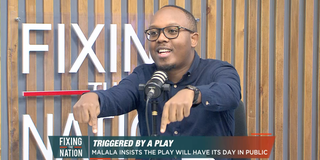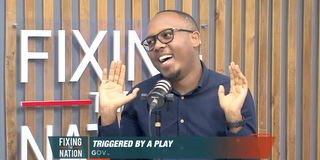We have returned to Moi-era censorship, Abel Mutua, Ian Mbugua warn
"We've returned to the days of Koigi wa Wamwere," declared filmmaker Abel Mutua during a recent episode on NTV’s "Fixing the Nation."
In Kenya's creative circles, those words resonate like an alarm bell, evoking memories of state-sanctioned artistic suppression many believed were downgraded to history.
The controversial handling of Butere Girls High School's drama festival production "Echoes of War" has ignited fierce debate about artistic freedom in Kenya, with tear gas reportedly deployed against students attempting to perform their court-sanctioned play.
The incident brought together two of Kenya's prominent creative voices on the popular "Fixing the Nation" show to address the growing concerns.
"It's sad that these are things we're talking about in 2025, to be honest," said Abel Mutua, whose own career launched through school drama festivals.
His sentiments were echoed by celebrated performing arts veteran Mr Ian Mbugua (alias ‘Judge’ Ian), who also appeared on the show virtually and lived through the censorship era of the 1990s.

Filmmaker and entertainer Abel Mutua.
The controversy centres around a production exploring themes of generational differences and religious critique. After initially being banned, then reinstated through court intervention, the performance faced dramatic disruption during the festival.
“Back in the ‘90s, we had to take our plays to Nyayo House to be vetted. When we wanted to do ‘Can’t Pay, Won’t Pay,’ we were told we can’t. Our lawyer, Mr Stephen Mwenesi, challenged that, and the court said there is absolutely nothing wrong with a play,” recalled Ian, a similar battle from his days at Phoenix Players.
The government’s heavy-handed approach appears to have backfired admirably. “They would simply have let it go on and very few people would have known about this play. But now everyone is talking about it. It has completely backfired,” observed Ian.
“It’s reached a point where Kenyans are willing to pay to see it. I’m getting many DMs (Direct Messages) saying, ‘organize this, we’ll book KNT (Kenya National Theatre),” said Abel Mutua, confirming this unintended consequence.
Both artistes suspect political sensitivities, rather than legitimate concerns, motivated the crackdown. “I feel like someone felt targeted. The fact that it was about governance and they felt it had to be addressed means they felt tagged. Why would they start suspecting themselves otherwise?” Abel Mutua said.
He added: “There’s a lot of politics that has gone into it, mainly because of the playwright. That is the main issue,” said Judge Ian, agreeing with Abel.
The peculiar handling of the situation has raised concerns about its effect on the students involved. “This on, off, on, off was wrong,” Ian said. “Telling them, yes, you can do it. No, you can’t do it. And then last minute, yes, you can do it. And yet they don’t have a director. They don’t have props. What do you expect them to do?”
He warned about potential psychological consequences: "It can bring up trauma, really. Here you are being told that the world is out there for you. You need to express yourself. If you've got a talent, please use it and we will help you. And then when you are using it, you are told no."
Following the controversy, the Ministry of Education attempted to justify its actions by questioning the credentials of drama trainers from outside the education sector.
“All the top schools and institutions always have trainers from outside, someone from KNT or elsewhere. If they’re capable and understand the industry, there’s no problem with that,” said Abel Mutua, dismissing the reasoning from Ministry of Education.

Filmmaker and entertainer Abel Mutua.
When asked by the ‘Fixing the Nation’ host if the incident might lead creators to self-censor, Abel Mutua was categorical: “When you get to a point where you feel like you need to start altering a few things so that you can fit a certain narrative, then we lose authenticity. That’s why art should not be interfered with.”
Instead of backing down, he called for vigilance: “If you see a little infringement, hit it hard. That is the only language people will understand.”
He added: “When you take that very structured way of addressing issues, you lock out many people. But when you get into that artistic way of doing it, you have the masses on the net. And that’s what they don’t want.”
Both artistes dismissed the notion that targeting specific artistic expressions would silence creative voices.
“You think by doing that you’re going to muzzle us as artists? Absolutely not. You will just have more and more people coming up and talking about the ills that are going on in the country,” declared Judge Ian.
As Kenya grapples with this renewed debate over censorship, both artists on “Fixing the Nation” emphasised that creative expression is protected in the constitution.
“Let the plays go on. Let everybody watch them. Let everybody make up their own mind. Art should not be stopped. It is enshrined in the constitution. Freedom of expression,” Ian advocated.
Abel Mutua added that public response to censorship attempts is crucial: “Jana (yesterday) was a beautiful day. It’s unfortunate, but the end result is beautiful.”
The controversy highlights how art forms ranging from traditional theatre to modern digital expressions represent powerful vehicles for social commentary.
"Young people are very woke. They know what is going on. Art is a form of communication. Art mirrors life, and what we need to do is just let them express themselves," said Ian as he concluded on the show.
As the dust settles on this latest clash between artistic freedom and government control, one thing remains clear from the "Fixing the Nation" discussions that Kenya's creative community stands united against censorship, determined that the days of Nyayo House script approvals remain firmly in the past.
nkirimi@ke.nationmedia.com


